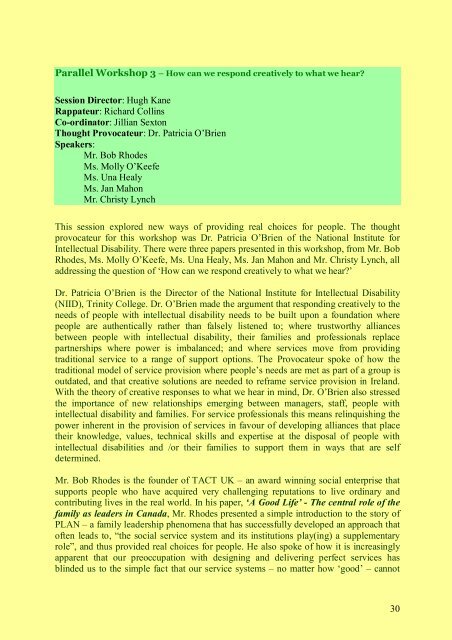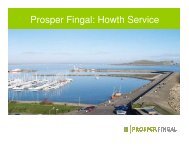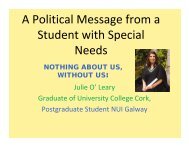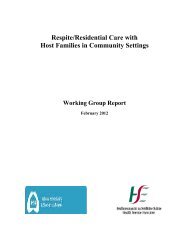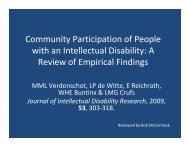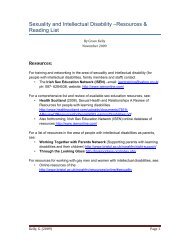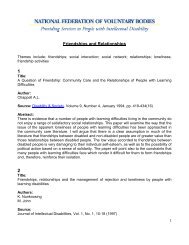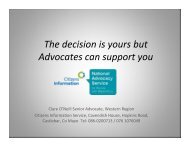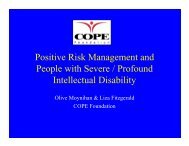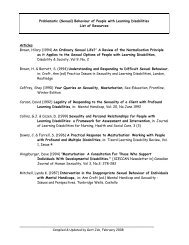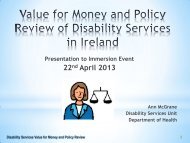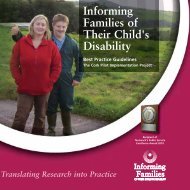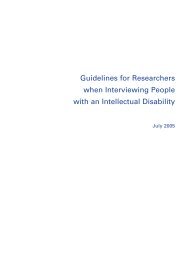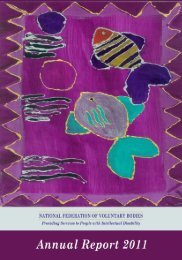Conference Proceedings Report - Final Draft - National Federation ...
Conference Proceedings Report - Final Draft - National Federation ...
Conference Proceedings Report - Final Draft - National Federation ...
Create successful ePaper yourself
Turn your PDF publications into a flip-book with our unique Google optimized e-Paper software.
Parallel Workshop 3 – How can we respond creatively to what we hear?<br />
Session Director: Hugh Kane<br />
Rappateur: Richard Collins<br />
Co-ordinator: Jillian Sexton<br />
Thought Provocateur: Dr. Patricia O’Brien<br />
Speakers:<br />
Mr. Bob Rhodes<br />
Ms. Molly O’Keefe<br />
Ms. Una Healy<br />
Ms. Jan Mahon<br />
Mr. Christy Lynch<br />
This session explored new ways of providing real choices for people. The thought<br />
provocateur for this workshop was Dr. Patricia O’Brien of the <strong>National</strong> Institute for<br />
Intellectual Disability. There were three papers presented in this workshop, from Mr. Bob<br />
Rhodes, Ms. Molly O’Keefe, Ms. Una Healy, Ms. Jan Mahon and Mr. Christy Lynch, all<br />
addressing the question of ‘How can we respond creatively to what we hear?’<br />
Dr. Patricia O’Brien is the Director of the <strong>National</strong> Institute for Intellectual Disability<br />
(NIID), Trinity College. Dr. O’Brien made the argument that responding creatively to the<br />
needs of people with intellectual disability needs to be built upon a foundation where<br />
people are authentically rather than falsely listened to; where trustworthy alliances<br />
between people with intellectual disability, their families and professionals replace<br />
partnerships where power is imbalanced; and where services move from providing<br />
traditional service to a range of support options. The Provocateur spoke of how the<br />
traditional model of service provision where people’s needs are met as part of a group is<br />
outdated, and that creative solutions are needed to reframe service provision in Ireland.<br />
With the theory of creative responses to what we hear in mind, Dr. O’Brien also stressed<br />
the importance of new relationships emerging between managers, staff, people with<br />
intellectual disability and families. For service professionals this means relinquishing the<br />
power inherent in the provision of services in favour of developing alliances that place<br />
their knowledge, values, technical skills and expertise at the disposal of people with<br />
intellectual disabilities and /or their families to support them in ways that are self<br />
determined.<br />
Mr. Bob Rhodes is the founder of TACT UK – an award winning social enterprise that<br />
supports people who have acquired very challenging reputations to live ordinary and<br />
contributing lives in the real world. In his paper, ‘A Good Life’ - The central role of the<br />
family as leaders in Canada, Mr. Rhodes presented a simple introduction to the story of<br />
PLAN – a family leadership phenomena that has successfully developed an approach that<br />
often leads to, “the social service system and its institutions play(ing) a supplementary<br />
role”, and thus provided real choices for people. He also spoke of how it is increasingly<br />
apparent that our preoccupation with designing and delivering perfect services has<br />
blinded us to the simple fact that our service systems – no matter how ‘good’ – cannot<br />
30


